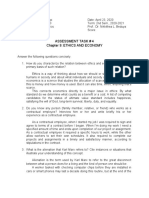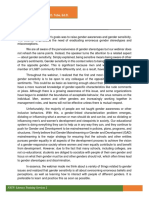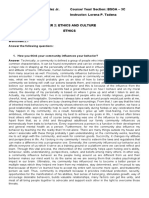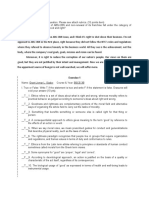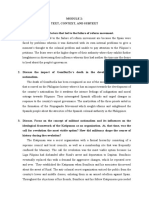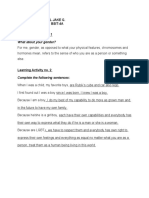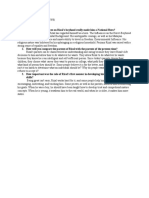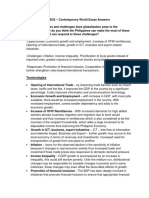Extrinsic and Intrinsic Evil
Extrinsic and Intrinsic Evil
Uploaded by
Jayson BaquitroCopyright:
Available Formats
Extrinsic and Intrinsic Evil
Extrinsic and Intrinsic Evil
Uploaded by
Jayson BaquitroOriginal Description:
Original Title
Copyright
Available Formats
Share this document
Did you find this document useful?
Is this content inappropriate?
Copyright:
Available Formats
Extrinsic and Intrinsic Evil
Extrinsic and Intrinsic Evil
Uploaded by
Jayson BaquitroCopyright:
Available Formats
Extrinsic and intrinsic Evil
The relation of action to the norm of morality is either intrinsic or extrinsic. Something
is intrinsic to a thing when it is integral to the nature of that thing, The sweetness of a
mango fruit is. for example, intrinsic to it.
But the appeal of a mango to a particular person is extrinsic to it. That is such quality
not an integral element of it as a fruit.
Some actions are intrinsically evil because their nature is defective either by excess or
by lack of certain attributes.
Ex. Is the nature of stealing which. By nature, manifest lack of respect for the property
of another.
some other actions are extrinsically evil because certain factors attached them by the
circumstances render them oppose to the norm of morality.
Ex. Drinking liquor is extrinsically evil when done in excess.
Actions that are intrinsically evil are extremely prohibited at all times and under any
circumstances.
Actions that are extrinsically evil may be tolerated provided by the circumstance
rendering it to be wrong is first removed. Suicide is intrinsically evil and remains immoral
whatever is its justification.
Ex. Therapeutic abortion is extrinsically evil when it is resorted as a necessary to
safeguard the life of the mother.
Imputability of Human Acts
A human act is done by a person who is in control of his faculties. Intellect and will. In
this sense. A person is like the captian of a ship who assumes full responsibility for his
decisions.
The imputability of a human act means that the person performing the act is liable for
such act. It involves the notion of guilt or innocence. Thus, actions are either
praiseworthy or blameworthy. Actions are attributed to the doer as their principal cause.
You might also like
- Pagkamaka-Diyos: Faith Alone Bro. Andrew Maria, MMHCNo ratings yetPagkamaka-Diyos: Faith Alone Bro. Andrew Maria, MMHC8 pages
- MODULE 1 (Lesson 2-3) in Gender and Society: Fiona Yvannie T. Murillo BSSW As 3-1100% (2)MODULE 1 (Lesson 2-3) in Gender and Society: Fiona Yvannie T. Murillo BSSW As 3-16 pages
- Reflect On The Importance of Influencers in An IndividualNo ratings yetReflect On The Importance of Influencers in An Individual1 page
- Assessment Task # 4 Chapter 9: Ethics and Economy100% (3)Assessment Task # 4 Chapter 9: Ethics and Economy2 pages
- Worksheet For Individual Activity: Can Myself Improve Amidst My Unlikely Acts?No ratings yetWorksheet For Individual Activity: Can Myself Improve Amidst My Unlikely Acts?1 page
- Baloca, Vincent Jay - Bsedeng - NSTP Lts A - Reflection About Gender SensitivityNo ratings yetBaloca, Vincent Jay - Bsedeng - NSTP Lts A - Reflection About Gender Sensitivity1 page
- Ge 3: Understanding The Self: First Semester, SY 2020 - 2021No ratings yetGe 3: Understanding The Self: First Semester, SY 2020 - 202112 pages
- TOPIC III: Moral Assumptions (Foundation of Morality)100% (1)TOPIC III: Moral Assumptions (Foundation of Morality)4 pages
- Ethics-And-morality GrantJomarSiador BSCE 3BNo ratings yetEthics-And-morality GrantJomarSiador BSCE 3B2 pages
- BSCpE-2B - Edano Lemuel - Final Term Module Output100% (2)BSCpE-2B - Edano Lemuel - Final Term Module Output8 pages
- How Globalization Is My Home?: InstructionNo ratings yetHow Globalization Is My Home?: Instruction5 pages
- Philippine Revolution Under Aguinaldos LeadershipNo ratings yetPhilippine Revolution Under Aguinaldos Leadership15 pages
- Name: Quia, Remuel Jake G. Course & Section: Bsit-4A: What About Your Gender?No ratings yetName: Quia, Remuel Jake G. Course & Section: Bsit-4A: What About Your Gender?5 pages
- 5 The Ethics of Sentiment Reason and Courage50% (2)5 The Ethics of Sentiment Reason and Courage34 pages
- Why Do Artists Use Appropriation?: Is Appropriation Art Legal?No ratings yetWhy Do Artists Use Appropriation?: Is Appropriation Art Legal?3 pages
- The Moral Act: Feelings and Moral Decision Making100% (1)The Moral Act: Feelings and Moral Decision Making14 pages
- Applied Ethics: Modifiers and Ends of Human ActNo ratings yetApplied Ethics: Modifiers and Ends of Human Act4 pages
- Select A Topic That Is Interesting To You.: Scripts Group 4 ENGL SU14No ratings yetSelect A Topic That Is Interesting To You.: Scripts Group 4 ENGL SU141 page













